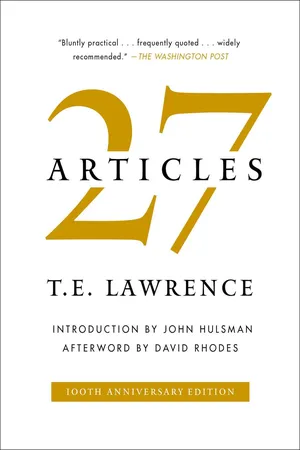![]()
27 Articles
T. E. Lawrence
August 20, 1917
The following notes have been expressed in commandment form for greater clarity and to save words. They are, however, only my personal conclusions, arrived at gradually while I worked in the Hejaz and now put on paper as stalking horses for beginners in the Arab armies. They are meant to apply only to Bedu; townspeople or Syrians require totally different treatment. They are of course not suitable to any other person’s need, or applicable unchanged in any particular situation. Handling Hejaz Arabs is an art, not a science, with exceptions and no obvious rules. At the same time we have a great chance there; the Sherif trusts us, and has given us the position (towards his Government) which the Germans wanted to win in Turkey. If we are tactful, we can at once retain his goodwill and carry out our job, but to succeed we have got to put into it all the interest and skill we possess.
![]()
Article 1.
Go easy for the first few weeks. A bad start is difficult to atone for, and the Arabs form their judgments on externals that we ignore. When you have reached the inner circle in a tribe, you can do as you please with yourself and them.
![]()
Article 2.
Learn all you can about your Ashraf and Bedu. Get to know their families, clans and tribes, friends and enemies, wells, hills and roads. Do all this by listening and by indirect inquiry. Do not ask questions. Get to speak their dialect of Arabic, not yours. Until you can understand their allusions, avoid getting deep into conversation or you will drop bricks. Be a little stiff at first.
![]()
Article 3.
In matters of business deal only with the commander of the army, column, or party in which you serve. Never give orders to anyone at all, and reserve your directions or advice for the C.O., however great the temptation (for efficiency’s sake) of dealing with his underlings. Your place is advisory, and your advice is due to the commander alone. Let him see that this is your conception of your duty, and that his is to be the sole executive of your joint plans.
![]()
Article 4.
Win and keep the confidence of your leader. Strengthen his prestige at your expense before others when you can. Never refuse or quash schemes he may put forward; but ensure that they are put forward in the first instance privately to you. Always approve them, and after praise modify them insensibly, causing the suggestions to come from him, until they are in accord with your own opinion. When you attain this point, hold him to it, keep a tight grip of his ideas, and push them forward as firmly as possibly, but secretly, so that to one but himself (and he not too clearly) is aware of your pressure.
![]()
Article 5.
Remain in touch with your leader as constantly and unobtrusively as you can. Live with him, that at meal times and at audiences you may be naturally with him in his tent. Formal visits to give advice are not so good as the constant dropping of ideas in casual talk. When stranger sheikhs come in for the first time to swear allegiance and offer service, clear out of the tent. If their first impression is of foreigners in the confidence of the Sherif, it will do the Arab cause much harm.
![]()
Article 6.
Be shy of too close relations with the subordinates of the expedition. Continual intercourse with them will make it impossible for you to avoid going behind or beyond the instructions that the Arab C.O. has given them on your advice, and in so disclosing the weakness of his position you altogether destroy your own.
![]()
Article 7.
Treat the sub-chiefs of your force quite easily and lightly. In this way you hold yourself above their level. Treat the leader, if a Sherif, with respect. He will return your manner and you and he will then be alike, and above the rest. Precedence is a serious matter among the Arabs, and you must attain it.
![]()
Article 8.
Your ideal position is when you are present and not noticed. Do not be too intimate, too prominent, or too earnest. Avoid being identified too long or too often with any tribal sheikh, even if C.O. of the expedition. To do your work you must be above jealousies, and you lose prestige if you are associated with a tribe or clan, and its inevitable feuds. Sherifs are above all blood-feuds and local rivalries, and form the only principle of unity among the Arabs. Let your name therefore be coupled always with a ...
